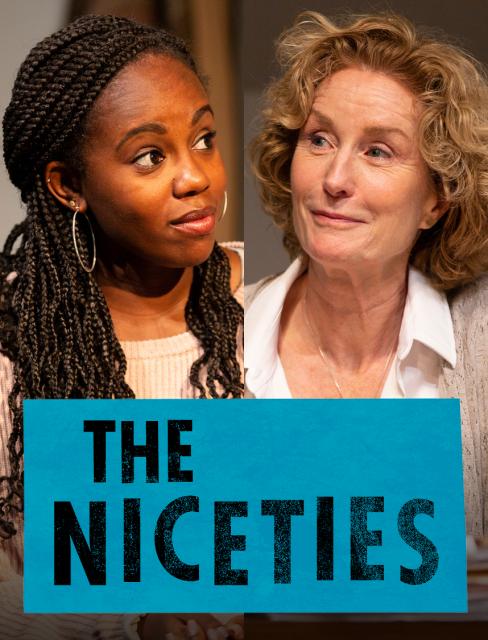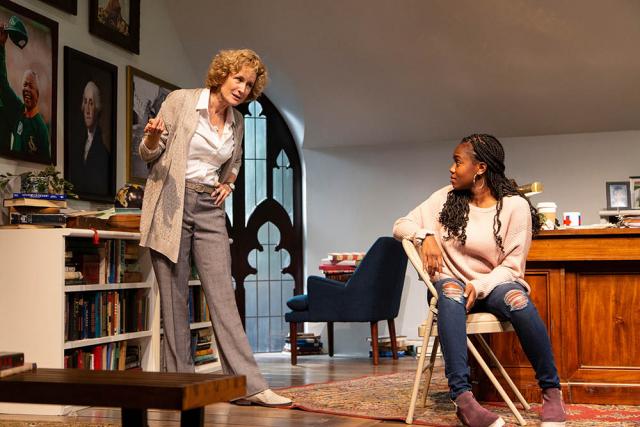

Black militant student challenges white liberal teacher in The Niceties, Eleanor Burgess’s provocative two-character play now running at The Geffen after successful runs on both coasts (including the Manhattan Theatre Club). Jordan Boatman (as the student, Zoe Reed) and Lisa Banes (as the professor, Janine Bosko) have been attached to this play from its 2017 start at the American Theater Festival in Shepherdstown, WV under the direction of Kimberly Senior; the time and work they have put into this project are on obvious display throughout, making for a production that is as flawless as it is powerful. Set in “an elite university in the Northeast,” the play is about race in America and the impact slavery and segregation have had on this country. Zoe and Janine argue this issue in the latter’s elegant campus office in March, 2016, the year Hillary Clinton was supposed to defeat Donald Trump in the presidential election. The context is important because Janine uses Clinton’s projected win to gain a point in her impassioned argument with Zoe. That a woman could become president on the heels of Obama’s two terms in the White House showed that America was becoming a better and more democratic country, she feels. Zoe rejects that claim, brusquely and even brutally. A brilliant but feisty and uncompromising radical—think a young Angela Davis—she doesn’t think Obama did that much to help black folks in America. They were still being beaten and killed by the police, sent off to fight in imperialist wars, sentenced to long jail terms (in private prisons) for minor infractions, educated in inferior schools, and so on. In short, they were second-class citizens and it was never going to change unless the balance of power shifted from white to black. That even held true on this campus, where white professors like Janine still had all the clout and where students like Zoe were a tiny, embattled minority. “There should be more black professors and students,” she tells Janine, “more black studies and textbooks, more black administrators.” The Niceties has plot elements that undergird the verbal battle over race. Zoe comes to Janine’s office to discuss a paper she has written as a rebuttal to the latter’s recent lecture on the American revolution. Unlike most revolutions which end up devouring their young, the American revolution was relatively bloodless and benign—a worthy and good revolution. Zoe’s paper debunks that notion, pointing out that the revolution did nothing for America’s black slaves (and native people), who were left out of the equation. America was—and is—an engine of racial oppression, she insists. Janine, who we soon learn, is the child of impoverished Polish parents, and gay to boot, believes she knows something about oppression and prejudice. She understands where Zoe is coming from, she says, and sympathizes with her like the well-meaning person she is. But Zoe doesn’t want her sympathy or her understanding; she wants change; action not words. The tough, blunt-talking girl is not above using a dirty trick to alter the balance of power between them; she secretly records her conversation with the professor, catching on tape Janine’s inadvertent racist remarks or gaffes. Zoe goes public with these revelations, via social media, and a scandal erupts. The play’s second act takes place three weeks after this eruption. Both combatants are in a somber mood: Janine has been suspended from her job; Zoe has received death threats. Janine reminds her that she tried to warn her that this might happen: the hard-core bigots out there were a dangerous, brutal bunch. The two of them try to reconcile, come to a compromise where their views on race are concerned. But neither can bend or change; tempers flare up again, nasty words are exchanged, and the stunned audience is left trying to decide which side is right.
